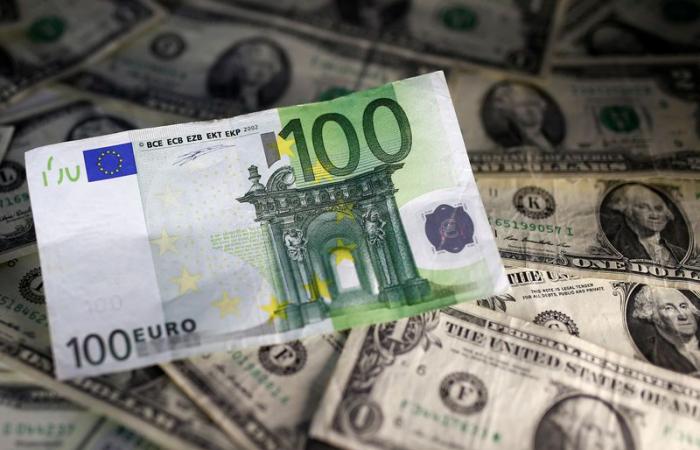The weakening euro will remain weak in the short term, stuck between the political ruins piling up in France and new US tariffs expected early next year that boost the dollar's appeal, according to a Reuters poll of of market strategists.
Although there is virtually no prospect of a rapid rebound, most strategists are nevertheless convinced that the euro will not fall to parity with the US dollar over the next three months, mainly because a large number of bad news is already taken into account.
With the French government likely to collapse later on Wednesday, after far-right and left parties table motions of no confidence in Prime Minister Michel Barnier, the euro has virtually no chance of recover the loss of almost 6% it has suffered since the end of September.
Concerns over euro zone growth, as well as stronger prospects of further interest rate cuts from the European Central Bank in the coming months, have pushed the single currency to its lowest level in two years, at namely 1.03 dollars, at the end of November.
Interest rate futures forecast more than 1.5 percentage points of rate cuts from the ECB by the end of 2025, twice as much as the US Federal Reserve, whose Expectations have been revised downwards due to the resurgence of domestic inflation risks.
Median forecasts of nearly 70 currency strategists polled by Reuters on Dec. 2-3 on the euro, which currently trades around $1.05, indicate it will be at that level in three months and at $1.04 in six months, a decline of about 1%, which is significantly lower than the $1.10 and $1.11 forecast in a November survey.
“There are distinct reasons why the euro is vulnerable, very much linked to the structural and political problems facing France and Germany. The pressing question is whether these problems will remain confined to France or whether it “There will be an element of contagion,” said Jane Foley, head of foreign exchange strategy at Rabobank.
“Germany also appears to be on the back foot as it is currently facing stagflation – a problem it has not been able to shake off – which is not a good sign for the euro.
NO PARITY YET WITH THE US DOLLAR
Yet only a handful of strategists predicted in their forecasts that the euro would match or fall below the dollar within six months. The last time it did so was between September and November 2022, when it most often traded below the greenback.
Asked about the chances of the common currency reaching parity with the dollar in the next three months, a majority of nearly 60 percent, or 24 out of 42, said the chances were “low.”
“Over the coming months, the chances of reaching parity are relatively low given the extreme weakness of the euro, particularly with regard to the relative price of the Fed's rate cut versus those of the ECB,” said Erik Nelson, macroeconomic strategist at Wells Fargo.
“While there are many elements, particularly geopolitical, that could push the euro below parity next year, the current positioning is already a bit extreme.”
The remaining 18 said the likelihood of parity by the end of February was “high” or “very high.”
In another recent Reuters survey of economists who cover the euro zone and ECB policy, nearly 90 percent, 34 of 39, said that President-elect Donald Trump's proposed tariffs would significantly affect the economy of the euro zone in the years to come.
“If Trump threatens to implement higher tariffs against the EU early next year or if the ECB accelerates the pace of rate cuts – perhaps a deeper reduction of 50 basis points to a at any given time over the next three months – this would drive the euro-dollar towards parity and potentially below,” said Lee Hardman, senior currency analyst at MUFG.
A majority of nearly 90%, or 38 of 43 people who responded to an additional question, said the U.S. dollar was more likely to be stronger than expected over the next three months than to be weaker than those forecasts .
(Other articles from the Reuters December foreign exchange poll)






